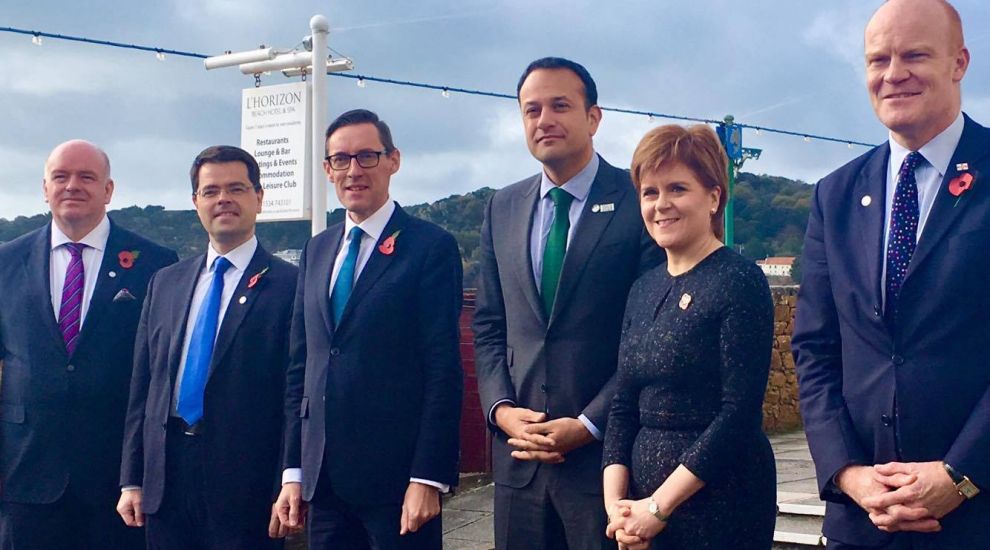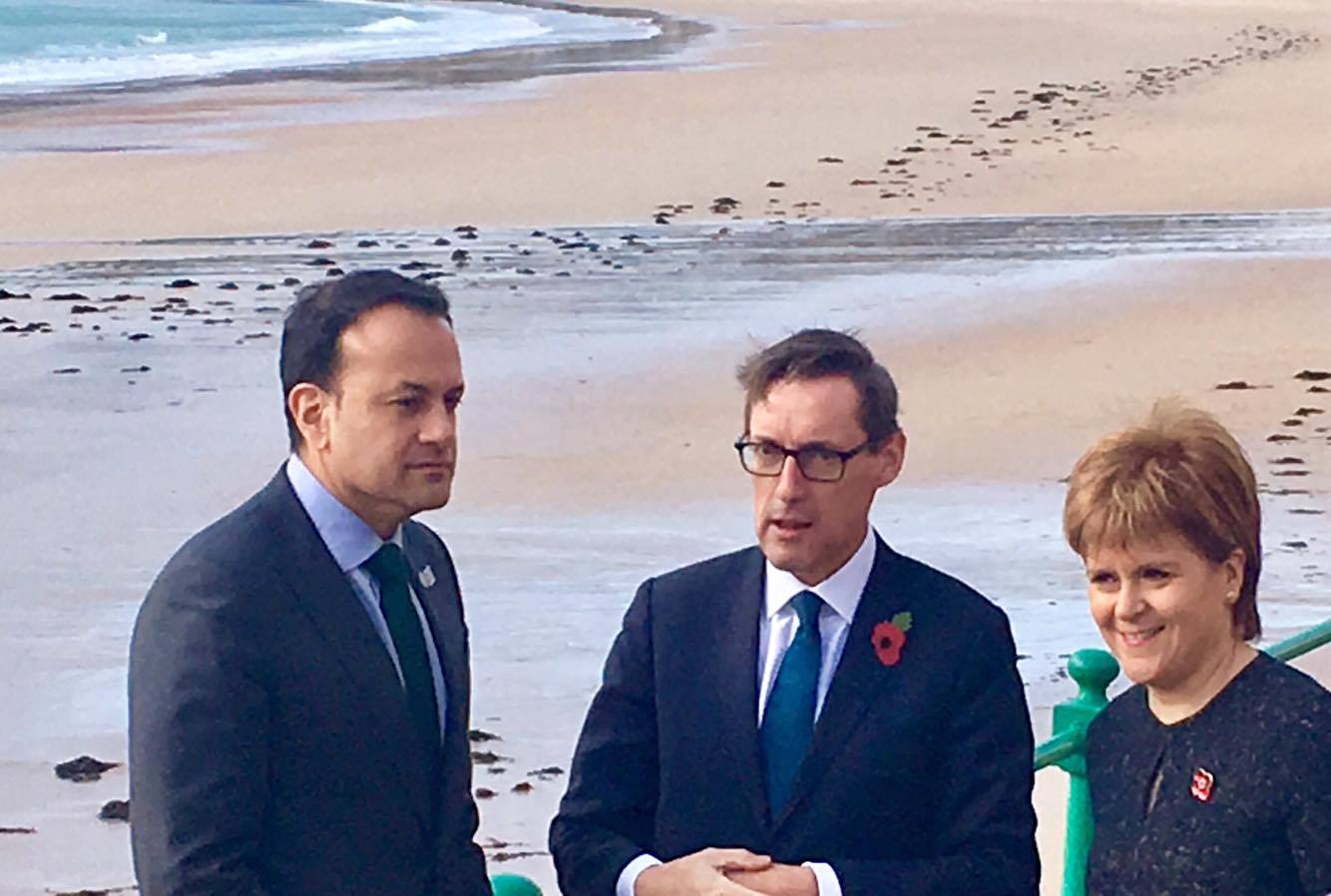

Political leaders from England, Ireland, Scotland and the Crown Dependencies yesterday gathered in Jersey amid the ongoing Paradise Papers controversy.
The 29th British-Irish Council Summit saw Chief Minister Ian Gorst welcome Scottish First Minister Nicola Stugeon, Irish Taoiseach Leo Vardkar, UK Secretary of State for Northern Ireland James Brokenshire, Isle of Man Chief Minister Howard Quayle and Guernsey Chief Minister Gavin St Pier to the island for discussions on key political developments across their jurisdictions.
Set against a backdrop of the Paradise Papers’ revelations in which the Crown Dependencies were heavily implicated, tax avoidance formed a focal point of discussions, with the Jersey, Guernsey and the Isle of Man all pledging their commitment to join the fight against “abusive” regimes.

Pictured: Senior officials in attendance included Irish Taoiseach Leo Varadkar and Scottish First Minister Nicola Sturgeon.
But the Council, which was formed in 1998 to foster cooperation across the British Isles following the Good Friday Agreement, also took the opportunity to consider the ongoing challenges of Brexit and the importance of promoting creative industries.
Express spoke to the delegates about the key issues...
The BIC meeting came just days after the Independent Consortium of Investigative Journalists (ICIJ) and Panorama revealed the complicated tax structures used by the rich, famous and influential to shield their wealth. The Channel Islands and Isle of Man were heavily implicated in the resulting exposés, but there was never any indication of criminality.
IoM Chief Minister Howard Quayle issued a robust defence against what he described as a “concerted attack” by the ICIJ. While he told Express that the island take the allegations “very seriously”, he said that it was “very disappointing” that Panorama had provided “zero evidence” of wrongdoing despite requests. “We’ve got nothing to hide and we’re more than happy if someone has been aggressive in avoiding taxes then we will take action against them, but please give us the evidence.” He expressed concerns that Crown Dependencies’ “good reputations have been slurred” but felt that they had already done enough to commit to and promote their transparency internationally. “How much more can we do?” he asked.
In light of recent media scrutiny, today’s BIC Summit provided a timely opportunity for me to reinforce the Isle of Man’s position as well-regulated, responsible and transparent international business centre https://t.co/C6Rqgs0aLk
— Howard Quayle (@HowardQuayleMHK) November 10, 2017
Senator Gorst echoed Mr Quayle’s defence, adding that he was actively promoting Jersey’s compliance with international standards globally. “Earlier this week, I was in the Middle East talking to what are going to be our growth markets and they were pleased with Jersey, satisfied with the business services that we were providing them and they saw opportunity to grow that. But at the same time we’ve got to be a good neighbour to Europe.”
The Paradise Papers also added further pressure as EU Finance Ministers met this week to consider an EU blacklist. Nonetheless, Robin Walker, Minister for the Department of Exiting the EU, praised the Crown Dependencies on their “strong record” of meeting international standards and said that the UK government would ensure that their “concerns around the process are heard at the European level.”
29th British-Irish Council Summit - Press Conference #BICJersey https://t.co/CBBodHQwNc
— States of Jersey (@StatesofJersey) November 10, 2017
Nicola Sturgeon said that the Paradise Papers were an opportunity for governments to remind their citizens of the “social purpose” of tax and called for tax loopholes that “unfairly minimise” individuals’ contributions to be closed down. “The tax we pay funds our public services, but it also funds the infrastructure and support that businesses need to create wealth… I very strongly believe that the approach to tax should not simply be that wealthy people concentrate on how little they can get away with paying - people should pay what they are fairly due to pay and that’s the position that we discussed,” she said.
The meeting came less than 24 hours after Ms Sturgeon accused the UK of leaving devolved administrations “substantially in the dark” during Brexit discussions.
Asked whether this meant there was little hope for the smaller Crown Dependencies, DexEU Minister Robin Walker, who will hold a meeting with Jersey officials on Monday, denied that this was the case. He told Express that there was a “very good working relationship” between governments and that he had so far enjoyed “very positive feedback” from previous meetings. “We want to make sure we’re engaging really intensively with every level with the devolveds and the Crown Dependencies.”
.@WalkerWorcester speaks after a constructive #BICJERSEY meeting and reaffirms our commitment to engaging with @BICSecretariat on EU exit pic.twitter.com/ksdfx4Z23f
— Exiting the EU Dept (@DExEUgov) November 10, 2017
Senator Gorst added that he had no concerns that Jersey’s interests were being adequately represented. “They [the UK government] understand what we want and would like to deliver out of it and we hope that continues.”
Although many BIC jurisdictions are dominated by the corporate sector, the creative industry enjoying steady growth - BIC governments say that it’s responsible for putting approximately £98.6billion into their economies. Promoting this emerging area formed a discussion chaired by Assistant Minister for Economic Development Murray Norton.
Though finance might appear to dwarf other industries in Jersey, Senator Gorst said that local creativity came in “many forms.” Some of these were exemplified at a special dinner, which featured performances from local pianist Georgina Sutton, Musical Originals and images from drone photographer BAM Perspectives.
Today chaired important @BICSecretariat discussions on Creative Industries with @ScotGovFM @FionaHyslop @carolinenokes @McHughJoeTD #Jersey pic.twitter.com/7rlXWRyKx0
— Murray Norton (@MurrayNorton) November 10, 2017
“We would be surprised by how many creative businesses we’ve actually got in Jersey from lots of Genuine Jersey businesses to last night we had a Jersey person - Christian Foley - who uses poetry and rap… At dinner last night after he had finished his poem, people couldn’t stop clapping,” he said. “It’s about things like that, creating those opportunities, allowing people to flourish in their own creativity," he said.
In the Isle of Man, 60% of the island have taken part in creative projects in the last year. The island is also enjoying the benefits of a growing film industry, and the positive impact from their national identity-promoting Manx Music Festival. Mr Quayle and his Economic Development Minister Laurence Skelly nonetheless said that they felt much could be learned from Jersey and other BIC governments. “‘Qui non proficit deficit’ - if you don’t advance you lose ground and you should always look at improving yourself and moving forward… [It’s] incredibly important to learn from people and then you cut and paste what’s relevant from you,” Mr Quayle said.
Attendees at #BICJersey were bowled over by the performance of @JustMuzMusic on the importance of communication and collaboration in politics. @BICSecretariat pic.twitter.com/eEXZBiJusN
— Senator Ian Gorst (@Ian_Gorst) November 9, 2017
Following the historic abuse revelations in Jersey’s Care Inquiry, Senator Gorst said that this might form part of talks going forward. “We know that the UK’s got an inquiry into historic abuse, we’ve got the Northern Irish one, the Scottish one, the Welsh one, so there’s a lot that we can exchange and learn in that area.”
He added that strong relationships between BIC countries should also prove fruitful for the future of Jerriais, as well as native languages across all jurisdictions. Mr Skelly commented: “We talk about creative industries and the grassroots are really the rich heritage and cultural diversity that we have in small jurisdictions… We look particularly at the Celtic nations and how they’ve done so I’m aware... how important it is to preserve the language. We hope that we can help Jersey in reviving that and keeping alive that cultural identity strong and positive.”
Many thanks to @StatesofJersey for hosting an excellent @BICSecretariat summit today. pic.twitter.com/WrlOLUdRBc
— Nicola Sturgeon (@NicolaSturgeon) November 10, 2017
Comments
Comments on this story express the views of the commentator only, not Bailiwick Publishing. We are unable to guarantee the accuracy of any of those comments.